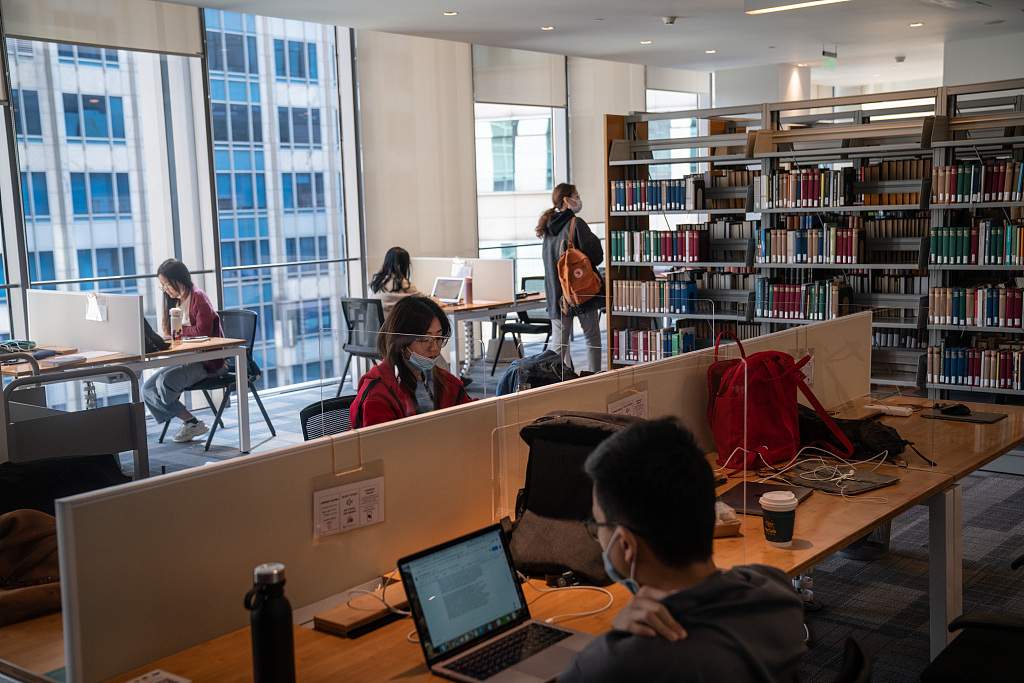Overseas study choices change for Chinese students amid COVID-19
- By Xu Xiaoxuan
 0 Comment(s)
0 Comment(s) Print
Print E-mail China.org.cn, January 16, 2021
E-mail China.org.cn, January 16, 2021

Faced with uncertainties inflicted by the COVID-19 pandemic, Chinese students are having to look for new destinations for overseas study, or even staying at home.
"Lectures supposed to feature students' participation and discussions in person are now being replaced by pre-recorded classes and putting perceptions on paper. Debates for brainstorming give way to written work," reported Zhang Xinyue, a senior at Ohio State University, who has been taking online classes for nine months at her home in Chengdu, southwest China's Sichuan province.
Every week, in addition to some 10 hours of recorded lessons, Zhang has to stay up late to have three-and-a-half hours of online live classes, where interactions with lecturers and classmates can be ensured.
However, pre-recorded classes are far from the panacea for overseas Chinese students now stuck domestically due to still rampaging COVID-19 abroad, especially in the U.S.
"For some majors, discussions are an indispensable part of most courses, forcing the students to attend live online classes all night," explained Zhang.
China is among the main exporters of international students. Nonetheless, the COVID-19 pandemic, along with ensuing travel restrictions, visa regulations and suspension of face-to-face courses, has made many Chinese students hesitate to go abroad, with some choosing alternative destinations, postponing or even canceling their overseas study plans.
According to a survey by Beijing Overseas-Study Service Association, about 73 percent of involved institutions reported a decline in overseas study counselling among Chinese students in 2020.
"The United States used to be the most popular country for Chinese students, but it's now been put on the back burner due to the country's awful handling of the pandemic. Instead, Britain, Singapore and Japan now hold more appeal to those seeking overseas study," said Wang Yin, founder of GreatChina International Education (GIE), a well-known international education institution preparing Chinese students for study in America.
Interrupted by the pandemic, Zhang is now applying to universities in Britain and Hong Kong, instead of the U.S., for her postgraduate study.
Some students tend to favor nearby countries and regions. According to a survey by Lingnan University in Hong Kong, three of the five most popular destinations for study abroad in the post-epidemic era are located in East Asia - Japan, Hong Kong and China's Taiwan.
"Among students of all ages, those who pursue high school and postgraduate study abroad are most affected," said Wang. He added that a GIE survey found some 80 percent of families intending to send their children to foreign high schools have turned to domestic international high schools instead.
Nearly 40 percent of master's degree applicants have delayed or canceled their plans to go overseas, instead opting for postgraduate recommendation or hunting a job at home.
Such changes are to a large extent driven by concerns over safety and health. The British Council, a British organization specializing in international cultural and educational opportunities, polled over 10,000 Chinese students and found that "personal safety" and "physical and mental health" headed the list of factors influencing the applicants' decisions, leaving traditional issues like high tuition fees and admission rate difficulties behind.
However, some students are as determined as ever to go abroad, irrespective of the pandemic threat, since they have invested so much energy and time in preparation, ranging from taking the TOEFL test and applying for internships to offering community services.
"I have spent so much time and money on preparing application for oversea study and I won't change my mind," said an 18-year-old Chinese girl Cheng Jiayi.
Whatever decisions Chinese students may take, as to what impact the epidemic has had and will have on overseas study, time will say.






Go to Forum >>0 Comment(s)